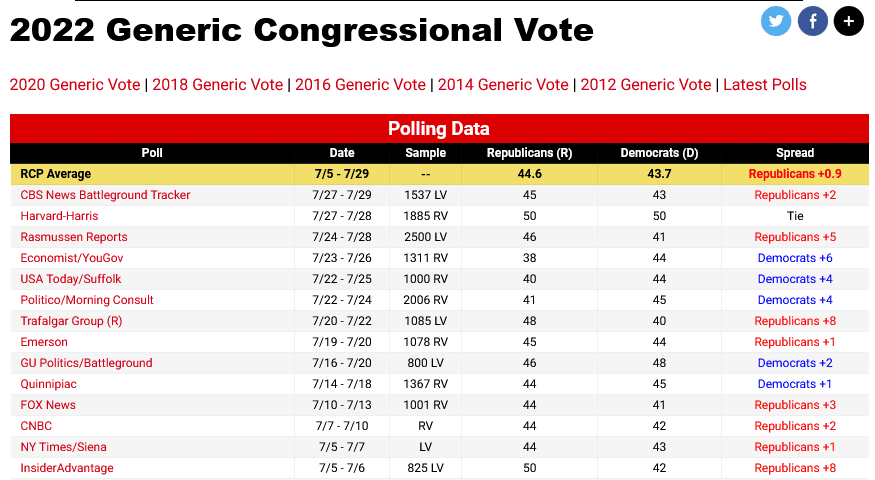
The GOP is poised to take over the U.S. House of Representatives in November’s midterm election, a new poll finds.
The latest CBS Tracking survey predicts a 15-seat loss for the Democrats from their 220-strong majority today. The GOP, the poll says, will gain 19 seats (including four vacant seats) for a 230-seat takeover.
The poll, which gave the GOP a two-point margin, 45 percent to 43, is consistent with the RealClearPolitics average of generic congressional races, which has the GOP ahead by about a point.
Democrats to Sit This One Out?
The GOP surge is likely because Democratic voters might not vote, CBS reported in its analysis, and the midterm voter is likely to be older and more conservative.
“Like typical midterm electorates, this one is shaping up to be older and more conservative than the country as a whole,” CBS reported:
Voter estimates indicate that as of now there are more 2020 Trump voters than Biden voters planning to vote this year, an obvious reversal from the last general election.
When Democrats took control of the House in 2018, the party affiliation of the electorate was four points more Democrat than Republican. Our estimates today show the opposite pattern: Republicans outpace Democrats by four points. So it’s just a more Republican-looking electorate overall.
The estimated party affiliation of probably voters is 38 percent Republicans to 34 percent Democrats, and redistricting and gerrymandering favor Republican candidates.
Also dooming the Democrats is inflation:
Republicans are leading among those who say inflation is “very important” in their vote, as well as those feeling “a lot” of impact from higher food and gas prices.
Those numbers are telling: 54 percent of Republicans are worried about inflation and gas prices, while just 35 percent of Democrats are.
Biden a Major Factor
And, of course, Joe Biden is one reason the numbers look bad for the party of abortion and transgenderism.
Forty-seven percent of voters say how they feel about President Biden is driving a lot of their midterm calculus.
“The Biden effect looks net-negative: those weighing him ‘a lot’ in their midterm vote are breaking Republican by two to one — maybe not a surprise given his low approval ratings,” the network reported:
That’s driven largely by Republicans, two-thirds of whom still don’t consider Mr. Biden the legitimate 2020 winner. Their negative views of him are motivating them, and they’re far more likely than Democrats to say their vote is based “a lot” on how they feel about him.
Only four in 10 Democrats say their vote is based a lot on their feelings about Mr. Biden, and those who do are no likelier to be voting Democratic this year than other Democrats.
The number on that question — is your vote in the midterm election really a vote on Biden — was not surprising. Sixty-two percent of Republicans said the midterms are a verdict on Biden, while just 39 percent of Democrats did.
Bigger Gains, RCP Data
Compared to some other surveys, CBS’s is somewhat understated, as Breitbart reported.
“For Republicans, winning the majority will require a net gain of only four seats in November, and much is on the line in both the House and the Senate,” the website reported. “Losing either could mean the Democrats and President Joe Biden will have a more challenging time passing their agenda items before the next presidential election.”
But the House loss could be much worse than 12 seats, the website continued:
Analysts from the University of Virginia Center for Politics, who predict the probable outcomes of House races, recently wrote that the House GOP would gain seats “somewhere in the 20s” and that the Supreme Court’s recent landmark opinion on abortion doesn’t seem to have a “huge impact” on the election.
In addition, analysts from the Cook Political Report, who also predict the probable outcome of House races, shifted their outlook on the midterm elections, noting that the net Republican gains could be between 20 and 35 seats.
As for the Real Clear Politics measure of the generic congressional vote, the GOP maintains its lead, although it has decreased.
The RCP puts the GOP ahead by 0.9 points, 44.6-43.7. A Rasmussen survey in late July, taken just before the CBS poll, gave the GOP a 5-point margin, 46-41.
The party has prevailed in eight of the last 14 polls.




